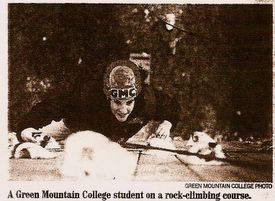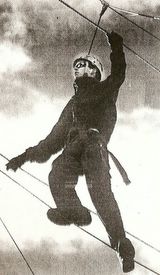
By David Abel | Globe Staff | 8/04/2000
Neither the oxymoron in the name of her major nor its lack of academic gravitas ever really bothered Jill Henneke.
While other students needled her for majoring in "leisure studies" - watching her
go ice climbing or sailing while they pored over hefty textbooks in more sterile settings - the 26-year-old recent graduate was happy to earn a degree by learning the intricacies of recreational activity.
"A lot of people stereotype adventure recreation," said Henneke, referring to her specialty at Green Mountain College in Poultney, Vt. "But it's not just sitting around a campfire and telling ghost stories."
In spite of its rocks-for-jocks reputation, leisure studies have carved out a significant and growing niche in academia. Leisure studies professors train their students in everything from the finer points of wilderness living to marketing sports programs as "therapeutic recreation. "
Today, more than 350 US colleges offer leisure studies programs, according to the National Recreation and Parks Association, a college accrediting group. And, with the boom in outdoor recreation from skiing to whitewater rafting, many students are landing lucrative careers in recreation management.
But wherever students and professors go, no matter how serious the discipline, the joshing jostles them.
"Granted, there's an image problem with the name," said Cary McDonald, acting chairman of the leisure studies department at the University of Illinois at Urbana-Champaign, one of the country's first programs. "It's amazing how many times our faculty has sat around talking about our name. Yeah, we're not physics or science, and we're kind of at the bottom end of the social science environment. But we shouldn't have to fight a battle for credibility."
What gives such programs a bad reputation, academics in the field say, are those schools that focus more on the practice of recreation than the study or business of recreation.
One potentially prickly example is Green Mountain College's recently announced partnership with the Killington ski resort. While students in the leisure studies department will learn about the administrative side of running a multi million-dollar mountain, school officials say, they'll also spend a good chunk of their time on the slopes.
"It's really ironic because the public recognizes the value of leisure," said Bob Riley, chairman of the recreation and leisure studies department at Green Mountain. "Yet when push comes to shove, we have to put up with comments about 'all you do is play all day.' "
The credibility problem forced a shakeout in the field about 10 years ago, as high-profile programs at schools such as the University of Maryland and the University of Oregon closed their leisure studies departments. But today, with the economy soaring, more people taking vacations, and tourism expanding throughout the country, the numbers of leisure studies programs and students entering the field are rebounding.
There aren't any recent surveys that document the upsurge,
 according to officials at the National Recreation and Parks Association. But leading professors in the field say the growth is especially evident in the demand for professors. Unlike most academic departments, where jobs are scarce, leisure studies departments across the country are trying to cater to more undergraduates and fill open positions.
according to officials at the National Recreation and Parks Association. But leading professors in the field say the growth is especially evident in the demand for professors. Unlike most academic departments, where jobs are scarce, leisure studies departments across the country are trying to cater to more undergraduates and fill open positions."We're really hurting for PhDs in our field," McDonald said. "We need more faculty. There were a hundred faculty jobs open nationwide (this year), and there's no way to fill them right now."
Leisure studies is the outgrowth of college parks and recreation departments, which began cropping up in academia after World War II when the combination of prosperity and baby-boom families increased the demand for organized recreation.
In the 1960s, with the rise of sociology and new fields in social sciences ranging from ethnic studies to gender studies, many of the parks and recreation departments began changing their name to leisure studies.
The discipline then shifted from its initial mission of training future park rangers or planners for city parks and recreation departments to delving into the sociological underpinnings of leisure, professors say. Today, there's even something called the Academy of Leisure Studies, which has a Web site featuring "white papers" on subjects including "The Problem of Free Time: It's Not What You Think," "Leisure's Relationship to Health," and "Leisure Apartheid."
Jokes over the arguably light subject matter started shortly after many of the college departments adopted the new academic title, professors say. And the jeering hasn't let up.
While professors in the field admit that leisure studies, like the legendary under water basket weaving or the more realistic physics for poets, have long attracted athletes or others interested in easy classes, they say spotty academic curricula have given way over the years to more rigorous standards.
"Too many of those curricula were created too quickly, were subpar intellectually, and were built around recreation," said Geoffrey Godbey, a leisure studies professor at Pennsylvania State University and author of "Time for Life: The Surprising Ways Americans Use Their Time." "But a lot of those programs have disappeared, and unlike years ago, I don't find people twitching to ask me if I have a ping-pong table in my office."
Though snide comments are still part of life for an academic in leisure studies, it's now more likely professors find people interested in their work, Godby and others say.
One source of such interest increasingly comes from officials in China and South Korea, where prosperity affords people more free time and more cash to spend. Godby and others say they often receive calls about translating their work.
Although there may be new opportunities and widening acceptance of the field, leisure studies professors' earnings haven't kept up with those in other academic disciplines. According to a 1999 survey by the College and University Personnel Association, leisure studies is one of the lowest-paying disciplines, not paying much more than the average $33,912 earned by those teaching secretarial services in 1998.
But as tourism continues to grow and people have more free time - a 1997 study by Godby and a leisure studies colleague at the University of Maryland found Americans have an average of 40 hours of free time each week, five more hours than in 1965 - money and jobs are expected to burgeon.
If Jill Henneke's experience is any measure, the future looks bright for leisure studies majors.
It didn't take her long after graduating from Green Mountain College this spring to land a fulfilling job. Little more than a month after graduation, she moved to West Virginia to oversee a program that takes troubled kids into the wilderness to teach them about more than starting fires and setting up camp.
"It's a chance to do some good for the kids, to teach them lessons about life," she said. "It's exactly what I wanted out of a job. And I don't know if I could have done it without studying what I did."
David Abel can be reached at dabel@globe.com. Follow him on Twitter @davabel.
Copyright, The Boston Globe

